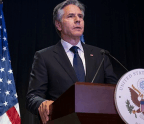Goodbye, Columbus? Here's what Indigenous Peoples' Day means to Native Americans
A growing movement recasts Oct. 11 as a day to appreciate the diversity and history of Indigenous communities. That visibility, say Native Americans, can help us see what else needs to change.
by Emma Bowman
Oct 11, 2021
3 minutes

This year marks the first time a U.S. president has officially recognized Indigenous Peoples' Day.
President Biden issued a proclamation on Friday to observe this Oct. 11 as a day to honor Native Americans, their resilience and their contributions to American society throughout history, even as they faced assimilation, discrimination and genocide spanning generations. The move shifts focus from Columbus Day, the federal holiday celebrating Christopher Columbus, which shares the same date as Indigenous Peoples' Day this year.
Dylan Baca, a 19-year-old Arizonan who was
You’re reading a preview, subscribe to read more.
Start your free 30 days





